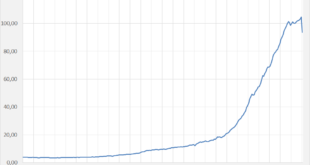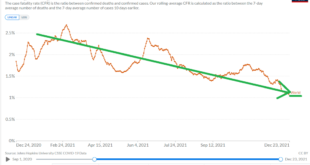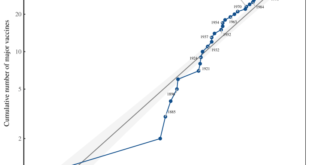That’s the headline for a story based on an email interview I did with Yahoo News. Over the fold, the full Q and A. What are your predictions for NSW given the current numbers?Assuming that Hazzard’s 25 000 cases a day estimate is correct, that 2 per cent are hospitalised and and average stay of 10 days, that’s 5000 people in hospital on any given day. NSW has 20700 hospital beds, so almost 25 per cent taken up with Covid What will this mean for hospitals?This will clearly...
Read More »Confusion reigns
from Peter Radford What on earth were they doing? Rocked but undaunted by the great financial crisis the orthodoxy of our central banks survived to fight another day. The system had been saved. That no one saw the onrushing crisis is still being debated. Of course some people saw it coming. Anyone with a scintilla of understanding of Minsky for instance. But those folk are hard to find in the top seats of central banks. The objective of the so-called independent central bank is to...
Read More »Economics & other crazy stuff: Happy New Year
I’m hoping next year we will make progress getting some of the crazier stuff out of the room. Here’s a little YouTube teaser from Down Under (give it a minute to get to the punchline): Who’s crazy now? All the best in 2022, Tom
Read More »Single Payer Healthcare Financing Series
I ran across this three-part series while reading one of Kip Sullivan’s articles “Kip Sullivan on the Creeping Privatization of Medicare, ” Corporate Crime Reporter If you wish to understand the evolution of healthcare and how we got to this point the US, the detail is here on YouTube. Kip starts the in the seventies detailing HMOs (HMO Act 1973) during the Nixon era. [embedded content] “Now there are a slew of these insurance companies like...
Read More »Open thread Dec. 28, 2021
A golden age of macro economic statistics 4. A Bank of England treasure trove.
The Bank of England has a 28 MB Excel dataset containing: “A millenium of macro economic data”. A treasure trove. A good thing about it: as it are long term series and as these are roughly based on national accounts data and not just on economics 101 it’s not only focused on GDP but also on sectoral developments and flows between and within sectors. I can’t show it all, and… will leave, to name only one (!) major part of it, the Flow of Funds data, which, among other things, show...
Read More »Happy Christmas and a healthy 2022
Open thread Dec. 24, 2021
COVID Déjà Vu
from Blair Fix As 2021 comes to a close, I’m having a distinct sense of déjà vu. A year ago, I wrote a post celebrating COVID vaccines as a triumph of science. And I noted that vaccine discovery is a collective endeavour. The cumulative number of major vaccines tracks closely with the cumulative number of scientific papers, a bellwether for humanity’s collective knowledge. Here’s the trend: Figure 1: The cumulative number of major vaccines tracks with the cumulative number of scientific...
Read More »Getting ready for the next pandemic: Can we get patent monopolies on the table?
from Dean Baker From the way our policy types talk about patents, or refuse to talk about them, they must think that the constitution guarantees life, liberty, and people getting incredibly rich from patents. Even as this pandemic has been needlessly prolonged by patent restrictions on the spread of technology for vaccines, tests, and treatments, resulting in millions of preventable deaths, we are still seeing no real debate as to whether we want to rely on these monopolies as a primary...
Read More » Heterodox
Heterodox



